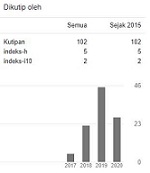WORKING STUDENT’S PERSPECTIVES ON THE FLIPPED CLASSROOM APPROACH FOR ENHANCING READING SKILL
Abstract
Keywords
References
Akçayır, G., & Akçayır, Ö. (2018). The flipped classroom: A review of its advantages and challenges. International Journal of Educational Technology in Higher Education, 15(1), 1–10. https://doi.org/10.1016/j.compedu.2018.07.021
Alptekin, C. (2011). Effect of working memory capacity and content familiarity in L2 reading comprehension. TESOL Quarterly, 45(2), 235–266. https://doi.org/10.5054/tq.2011.247705
Bergmann, J., & Sams, A. (2012). Flip your classroom: Reach every student in every class every day. International Society for Technology in Education.
Braun, V., & Clarke, V. (2006). Using thematic analysis in psychology. Qualitative Research in Psychology, 3(2), 77–101. http://dx.doi.org/10.1191/1478088706qp063oa
Creswell, J. W. (2013). Qualitative inquiry and research design: Choosing among five approaches (3rd ed.). SAGE Publications.
Diningrat, S. W. M., Setyosari, P., Ulfa, S., & Widiati, U. (2023). The effect of an extended flipped classroom model for fully online learning and its interaction with working memory capacity on students' reading comprehension. Journal of New Approaches in Educational Research, 12(1), 77–99. https://doi.org/10.7821/naer.2023.1.1073
Rindaningsih, N. (2018). Effective models for implementing flipped classrooms. Journal of Educational Technology, 9(2), 44–55. https://doi.org/10.14507/jet.2018.02.44
Ardi, S. W., Arisanti, K., & Hasanah, S. (2023). The impact of a flipped classroom on reading comprehension in students. Educação & Formação, 6(4). https://doi.org/10.29062/edu.v6i4.555
Suparman, A., Kusnadi, S., & Adiredja, R. (2023). The flipped classroom: A story from an EFL classroom in Indonesia. English Language Teaching World Online (ELTWO). ERIC Number: EJ1397165
Yakob, S., Jawawi, R., Shahrill, M., & Jaidin, J. H. (2023). The effects of flipped classrooms in English language communicative skills. International Journal of English and Communication Education, 2(2). https://doi.org/10.36312/ijece.v2i2.1394
Hoque, M. S., Islam, M., Thurairaj, S., Zarina, M. P., & Farahdina, T. (2023). Flipped classroom pedagogy in higher education in EFL contexts: Findings and implications for further research. Frontiers of Language Studies, 5(1). https://doi.org/10.18063/FLS.v5i1.1534
Perna, L. W. (2023). Understanding the working college student: New research and its implications. Journal of Higher Education Policy and Management.
Deng, R., & Gao, Y. (2023). Effects of embedded questions in pre-class videos on learner perceptions, video engagement, and learning performance in flipped classrooms. Frontiers of Education, 8(2), 12–27. https://doi.org/10.3389/feduc.2023.1028345
Aidoo, B., Tsyawo, J., Quansah, F., & Boateng, S. K. (2022). Students' learning experiences in a flipped classroom: A case study in Ghana. International Journal of Education and Development using Information and Communication Technology, 18(1), 67–85.
Lam, C. P., & Siew, N. M. (2024). Flipped classroom in science education: Correlating student experience with attitudes. Problems of Education in the 21st Century, 82(5), 672–686.
Yulianti, K. (2023). Students' perceptions on the use of flipped learning. In Proceedings of the International Conference on Research in Education and Science (ICRES) (pp. 72–84). Cappadocia, Turkey: International Society for Technology, Education, and Science.
Ecton, W. G., Heinrich, C. J., & Carruthers, C. K. (2023). Earning to learn: Working while enrolled in Tennessee colleges and universities. AERA Open, 9(1), 1–20.
DOI: 10.53712/ellite.v8i1.2555
Refbacks
- There are currently no refbacks.







